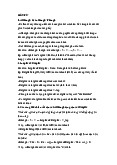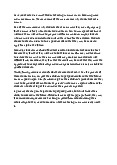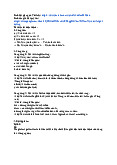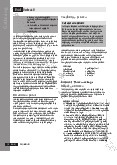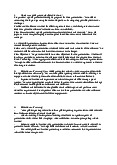


Preview text:
Childhood memory
Everyone has to have a childhood memory. Whether it's beautiful or
not beautiful, it gets brighter but it also makes a certain, elusive
impression in everyone. Me too, my favorite childhood memory was getting into first grade.
It was a beautiful day, and my father passed me on his motorcycle to
school. I sat clutching my father behind me with a feeling of euphoria
and anxiety about attending school. At first I was so excited about the
opening day that I could get new clothes and book bags to go to school,
but as soon as I arrived at the school, he said goodbye. For the first time
in my life I could remind myself and cheer myself, "I will do it, I won't
cry," and plucked up the courage to enter the gate. The school was
crowded with flags of flowers, bustling and bubbling, but I knew no
one; my friends and teachers were strange, and everything was new. I
realized that I was not alone in this situation, and I looked into the eyes
of all the new students who came to school, and their eyes were
swollen, and they were red from tears. After the opening talk we were
about our class, the welcoming smile of the head teacher lifted my
confidence and gave me no more shyness and fear, and I thought to
myself that I would eventually get used to it.
Until now that I'm traversing middle and high school and college, but
each lecture I feel like a childhood. I will never forget that feeling in my
life. Maybe it's because school has been a constant blessing in me, and
I'll take that as my motivation for doing my best every day. Effect divorce children
Some couples who are constantly at odds with each other think that a
divorce would be better for their children, since it would be better for
children to see their parents arguing. But in fact they're doing a lot of damage to their children.
The first effect is, children have a sense of loss, of rejection. When the
parents’ divorce, the child is forced to live with one of them. If one
parent does not visit regularly, questioning whether the child is of any
age will feel deprived and lost mentally. The second influence is that
children will develop erratic, aggressive personalities. Growing up, a
child needs both parenting and parenting. With single - parent families,
control becomes more difficult. This leads to an imbalance in the child's
psychological development process. For example, children are subject
to ridicule and disrespect at school when a parent no longer shows up
in their life. The decline in education is the third influence on children in
many families, and divorce means that the child has to move to another
residence or school. If a child is lucky to stay home and does not get to
know teachers and new friends, teasing friends about "lack of fathers"
or "absence of mother" can lead to fear of going to school. This has a
serious effect on a child's psychology and academic performance.
In short, divorce is bad for each couple and their children. It can have a
lot of physical and emotional effects on a child. So before you think of
divorce, think about the children.
In the present era, technology is increasingly being applied in
education. And also, in college, there is an opposite way of learning in
the classroom, which is taking a distance course. Just like traditional
classes, online instructors use discussion, assignments, and community
to educate students. However, their means of execution for these tools are quite different.
Both online classes and traditional classes require students to manage
time wisely. In traditional classes, students schedule time outside the
classroom for learning, doing projects, and doing homework. However,
online courses require students to self-internalize and study the course
materials. This freedom is what makes online classes attractive to non-
traditional students, who may work extra attending ordinary classes a
challenge. In a class-based course, face-to-face communication creates
a different dynamic for each classroom. However, online classes lack
this interaction, which requires teachers to use forums, conversations,
and other online example zoom, meet, and teams to build a community.
Instructors in traditional classes can come up with almost all kinds of
assessments, from written assignments to tests to oral tests and
presentations. However, online classes are more limited in the type of
exercise that students can complete. Typically, online instructors score
students through newspaper articles, open-book tests, and student
contributions to online discussions. Because online students must be
self-directed, online instructors often design practical exercises.
In summary, between online and traditional learning, individuals
should be careful when choosing appropriate learning methods. For
me, if you let me choose between these two, I would choose the traditional classroom.
